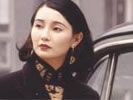Eye For Film >> Movies >> Centre Stage (1992) Film Review
Centre Stage, Stanley Kwan’s landmark film about the legendary Shanghai silent film actress Ruan Lingyu, whose performance as a mother driven to prostitution in Yu Wonggang’s Goddess (1934) is one of the most powerful and naturalistic in silent film history, transcends the biopic genre. The film’s radical break with traditional narrative structure, all the more striking in that it emerges from one of the most commercial industries in the world, is clear evidence of the challenge the new wave directors such as Kwan and his contemporaries Wong kar-wai and Ann Hui, were issuing to the Hong Kong film industry rooted in generic formulas and visual titillation.
By mixing archive footage, the dramatisation of scenes from Ruan’s life and films, with contemporary interviews featuring Ruan’s surviving collaborators and historians as well as the film’s own actors, Kwan aptly probes the boundaries between reality and fiction that were so paper thin during Ruan’s own life. Ruan Lingyu was an actress who paradoxically embodied the progressive concept of the ‘new woman’ then emerging in intellectual circles, but whose private life still provoked major scandals in the public eye. Private and public, truth and fiction seemed to break down altogether in 1934, when she starred in a film entitled New Woman by Cai Chusheng, whose protagonist is driven to suicide by the sensationalist media. This further provoked the ire of the press and the resulting backlash caused her to follow the example of the character she played by taking her own life with an overdose of sleeping pills on International Women’s Day.

Using a novel multi-layered approach Kwan is also able explore the links between the Hong Kong film industry of the early Nineties and the birth of China’s film industry in 1930s Shanghai, making the film something of a cultural stock-taking exercise whilst simultaneously clearing artistic space for himself and his contemporaries.
But despite, or perhaps because of, its formal bravura, the film still functions admirably as a deeply moving melodrama. In fact several of the best scenes derive their expressive power from the movement between the film’s many layers. After shooting the dramatic climax of New Woman, in which she cries out for life on a hospital bed, Ruan is unable to disassociate herself from her character and breaks down into tears, covering her head with a sheet. The director Cai sits on the bed next to her and the camera slowly zooms into the sheets, switches to black and white and zooms out to reveal the arch-manipulator Stanley Kwan sitting at the camera. He calls "cut" and immediately the image turns to archival footage from New Woman. There are four layers at work here: the film dramatisation with Maggie Cheung’s and Tony Leung’s performance; Stanley Kwan’s presence, self-reflexively revealing the film within a film; the original footage, which acquires fresh power from its recontextualisation as well as enhancing the impact of the dramatisation; and finally the tragic reality of Ruan’s own life, which is suggested by her inability to make a distinction between her character and her self. Like a Chinese box, the film’s various layers slip inside one another, the parts resonating through the whole and interacting in complex and innovative ways.
This audacious bid for attention did not go unnoticed, with the film picking up three Hong Kong Film Awards, though ironically not for best picture or director, and Maggie Cheung went on to win a silver bear at the Berlin Film Festival for her stunning performance. Although she had already been cast in some artistically challenging roles, most notably those of Wong Kar-wai’s Days Of Being Wild and Ann Hui’s Song Of Exile, Maggie was still best known for her supporting roles as Jackie’ Chan's comic foil May in the Police Story films.
This film was to see the final stage of her transformation into actress. It also represented the first time she completely dedicated herself to a project, working closely with the director and spending a full three months on location in Shanghai without taking on any other roles, quite impressive in an industry in which a film can be shot in less than a month and actors invariably act in three movies simultaneously (at this point Maggie herself had notched up an impressive filmography of more than 50 titles in eight years).
Indeed the self-referential qualities of the film are all the more striking in relation to Maggie, who has had a notoriously uneasy relationship with the Hong Kong paparazzi, and the film also dramatises her own flowering into a great actress, most evidently in the scene in which Ruan approaches Director Pu and asks him for the lead role in his new film. Pu is convinced Ruan is unsuitable to play a revolutionary because she has a history of playing romantic figures, but her response is merely to slowly wipe off her lipstick with a handkerchief and to stare directly back at him, answering him with her eyes. Similarly this is a film that stares directly at its audience and forces them to change their preconception of what a film can be.
Reviewed on: 29 Mar 2007


















